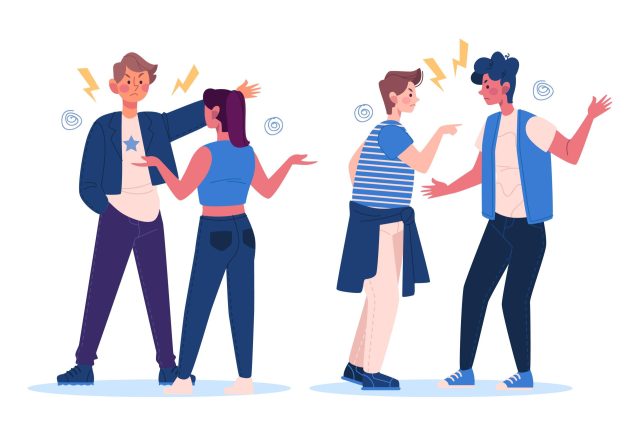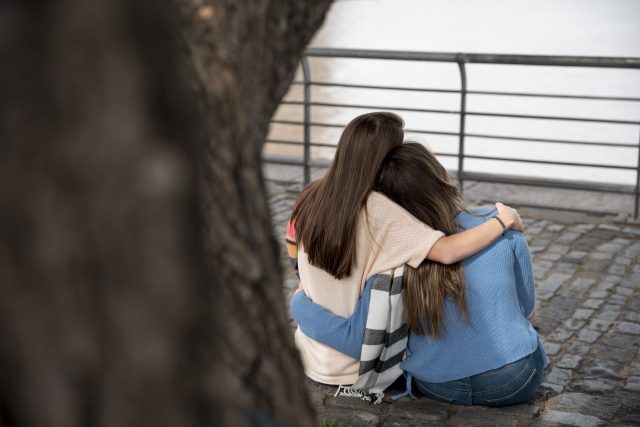The Unseen Impact of Passive-Aggressive Behavior on Friendships
By John V
May 19, 2023 • Fact checked by Dumb Little Man

Our lives would not be complete without the support, companionship, and shared experiences that friendships offer. Passive-aggressive behavior, a subtle but damaging force that can undermine the foundation of trust and understanding, can, nevertheless, cause even the strongest friendships to become strained.
In order to understand the effects of passive-aggressive behavior on friendships, we will go deeper into its nature, its historical context, and examples from everyday life in this extensive post. We’ll also talk about the underlying issues that are frequently ignored and provide advice on how to spot and deal with passive-aggressive behavior in order to keep friendships happy and healthy.
Overview

Passive-aggressive behavior is a complex pattern of indirectly expressing negative feelings and emotions, often characterized by resistance, and intentional mistakes, and indirectly expressing negative emotions.
While it is not classified as a distinct mental disorder, it can be associated with certain personality disorders such as passive aggressive personality disorder or negativistic personality disorder.
Recognizing passive-aggressive behavior is important for understanding the underlying issues and effectively addressing them. In this article, we will explore the concept of passive-aggressive behavior, its impact on relationships, and strategies to recognize and cope with passive-aggressive behaviors.
By gaining insight into these behaviors and learning how to navigate them, we can better understand our own passive-aggressive tendencies, manage negative emotions, and improve our overall well-being.
Understanding Passive Aggressive Behavior
Passive-aggressive behavior is all about indirectly expressing negative emotions or frustrations instead of addressing them head-on. It shows up in various ways, like sarcasm, giving silent treatment, procrastination, or purposely falling short of expectations.

The term “passive-aggressive” actually originated during World War II, used to describe soldiers who would disobey orders or engage in acts of sabotage. Nowadays, it’s a broader term encompassing behaviors that harm friendships and other relationships.
In today’s society, passive-aggressive behavior poses a real challenge in our interactions. It can lead to misunderstandings, breed resentment, and undermine trust among friends. Understanding the historical context behind this behavior helps shed light on why some people resort to these tactics to deal with their emotions.
By grasping the roots of passive-aggressive behavior, we can better navigate our friendships and relationships. It empowers us to approach conflicts and emotional challenges with a more open and proactive mindset. Developing effective communication skills and addressing underlying issues are key to building healthier and more fulfilling connections with others.
RECOMMENDED DATING SITE | REVIEW | VISIT |
|---|---|---|
 | Top dating site with over 16 million active members. Free to Try! |  |
Life Experiences
Let’s take a closer look at some real-life examples to better understand the impact of passive-aggressive behavior on friendships.

Consider the story of Emily and Sarah, two lifelong friends who found themselves growing apart. Emily would often make snide remarks about Sarah’s career choices, leaving her feeling unappreciated and unsupported. In response, Sarah would distance herself from Emily, ignoring calls and texts and resorting to silent treatment. With both parties unwilling to openly address the issue, their friendship slowly deteriorated. They felt wounded and misunderstood, and the lack of honest communication led to a gradual breakdown of their once-strong bond.
Another case to consider is the friendship between Jake and Matt, which became strained after an argument over a shared project.

Rather than discussing their problems openly, Jake started procrastinating on his responsibilities while Matt made passive-aggressive comments about Jake’s laziness. The unresolved conflict created a cycle of resentment and eroded the trust between them. Ultimately, their connection weakened as they found it increasingly difficult to rebuild the trust and understanding that once characterized their friendship.
These real-life examples highlight the destructive power of passive-aggressive behavior in friendships. The absence of open and honest communication, coupled with the use of subtle jabs and avoidance tactics, can erode trust, breed resentment, and ultimately damage the foundation of any relationship.
It is essential to recognize the signs of passive-aggressive behavior and address them promptly to prevent further harm and foster healthier, more fulfilling friendships.
Underlying Problems in Friendships

A number of things, including insecurity, resentment that isn’t addressed, and fear of confrontation, can lead to passive-aggressive behavior. It frequently happens in friendships because of unsolved issues or unmet demands that are not publicly discussed.
This breakdown in communication can result in a cycle of passive-aggression, which can strain friendships and make problem-solving more difficult.
Insecurity:
Insecurity may lead friends to use passive-aggressive behavior as a means of protecting themselves from vulnerability. For example, a friend might make snide remarks or belittle others to feel better about themselves or mask their own insecurities.
Fear of confrontation:
Some people may avoid direct confrontation due to the fear of conflict or potential damage to the friendship. Instead, they might resort to passive-aggressive behavior as a way of expressing their dissatisfaction without having an open conversation.
For instance, a friend might frequently cancel plans at the last minute to communicate their frustration without addressing the issue directly.
Unresolved issues:
Passive-aggressive behavior can stem from unresolved issues in the friendship that have not been openly discussed. These issues can fester and manifest as passive-aggressive actions, making it harder to resolve the problem.
An example of this is a friend who constantly brings up past mistakes to subtly criticize or guilt-trip the other person.
Unmet needs
When a friend’s needs or expectations are not met, they may resort to passive-aggressive behavior to express their dissatisfaction. For instance, a friend who feels their emotional needs are not being met might engage in the silent treatment to signal their unhappiness without directly addressing their feelings.
Effects of Unaddressed Passive-Aggressive Behavior

Passive-aggressive behavior that goes unchecked can negatively affect friendships and other facets of life in the long run. If these habits are not addressed, there may be severe repercussions, such as:
Increasing stress:
Persistent passive-aggressive behavior can lead to a buildup of tension within the friendship, creating an atmosphere that is both tense and uncomfortable. This constant state of unease can make it difficult for friends to relax and enjoy their time together.
For example, one friend may be constantly walking on eggshells, anticipating the next passive-aggressive remark or action, which can create anxiety and strain the friendship further. As stress levels rise, the chances of open and honest communication decrease, further exacerbating the problem and making it more challenging to resolve underlying issues.
Resentment:
Passive-aggressive acts that go unresolved can lead to resentment that festers, making it challenging for both sides to truly appreciate the friendship. Unaddressed resentment can build up over time, causing friends to become passive-aggressive in their interactions.
For instance, one friend may be resentful that the other doesn’t make time for them, leading to sarcastic comments about the other friend’s social life or priorities.
Communication breakdown:
Ongoing passive-aggressive behavior can obstruct honest, open communication, making it challenging for friends to express their emotions and settle disputes. A lack of effective communication in the friendship can result in a cycle of passive-aggression, making problem-solving more difficult.
For example, if friends don’t openly discuss their concerns, they may engage in passive-aggressive tactics, such as leaving notes or making indirect comments on social media, rather than addressing the issue in person.
The loss of trust and intimacy:
When passive-aggressive behavior is allowed to persist, it can gradually erode the trust and intimacy that serve as the foundation of a strong and healthy connection between friends. Subtle insults, backhanded compliments, and indirect communication can create an atmosphere of uncertainty and doubt.
Over time, the recipient of passive-aggressive behavior may start questioning the sincerity and authenticity of their friend’s actions and words.
Friendship breakdown:
If passive-aggressive behavior persists and remains unaddressed, it can lead to a complete breakdown of the friendship. The constant cycle of subtle insults, avoidance, and underlying tension can create a toxic environment that becomes unsustainable for both parties involved. Over time, the accumulation of unresolved conflicts and unmet needs can erode the foundation of trust and emotional connection, ultimately leading to the deterioration of the friendship.
The friends may reach a point where the negative effects of the passive-aggressive behavior outweigh the benefits of maintaining the relationship, resulting in a complete dissolution of the friendship.
Effect on mental health:
The impact of passive-aggressive behavior is not limited to the dynamics of the friendship; it can also have significant consequences on a person’s mental health. The ongoing exposure to passive-aggressive actions and communication can create a constant state of tension and uncertainty, causing increased stress and anxiety.
The recipient of passive-aggressive behavior may constantly second-guess themselves, questioning their worth and constantly feeling on edge. Over time, this chronic stress can take a toll on one’s mental well-being, leading to symptoms of anxiety, depression, and a decreased overall sense of happiness and fulfillment.
It is essential to recognize the detrimental effects of passive-aggressive behavior on mental health and take steps to address and resolve these underlying issues to protect one’s emotional well-being.
Negative effects on work performance:
When passive-aggressive behavior spills over into the workplace, it can have detrimental effects on work performance and productivity. The tension and unresolved conflicts from the friendship can create a toxic atmosphere, leading to decreased motivation, difficulty collaborating with colleagues, and increased stress levels.
Passive-aggressive individuals may engage in subtle acts of sabotage, such as withholding information, procrastinating on important tasks, or making backhanded comments that undermine team dynamics.
These behaviors not only hinder personal growth and professional development but also impact the overall success of the team and organization.
Stressed-out relationships with others:
Passive-aggressive behavior in one friendship can have a ripple effect, impacting relationships with others as well. The negative energy and unresolved conflicts from the passive-aggressive friendship can spill over into interactions with mutual friends or acquaintances.
It can create a strained atmosphere and increase the risk of confrontation or misunderstandings in social settings. Friends may find themselves caught in the middle or feeling uncomfortable due to the underlying tension. In some cases, passive-aggressive behavior can even lead to the formation of factions or alliances within a social group, further straining relationships and causing divisions.
It is essential to recognize the potential impact of passive-aggressive behavior on other relationships and take steps to address and resolve the underlying issues to prevent further stress and discomfort among social circles.
You can try to resolve disputes and keep positive, supportive relationships with those close to you by identifying and dealing with passive-aggressive behavior in friendships.
RECOMMENDED DATING SITE | REVIEW | VISIT |
|---|---|---|
 | Top dating site with over 16 million active members. Free to Try! |  |
Recognizing Passive-Aggressive Behavior
Navigating friendships can be challenging, especially when dealing with passive-aggressive behavior, which often goes unnoticed or unaddressed. By learning to recognize these subtle cues, you can take the first step toward addressing and resolving conflicts in your friendships.

Below are some common indicators of passive-aggressive behavior that you might encounter:
- Subtle insults or backhanded compliments
- Avoidance of confrontation or direct communication
- Procrastination or deliberate failure to meet expectations
- The silent treatment or withdrawal from social interaction
- Sarcasm or ambiguous statements that leave room for misinterpretation
Keep an eye out for these behaviors to ensure that you can maintain healthy and supportive friendships.
Dealing with Passive-Aggressive Behavior

Dealing with passive-aggressive behavior in friendships can be challenging, but it is essential to maintain a healthy and supportive relationship. Here are some steps to take when confronted with passive-aggressive actions in your friendships:
- Engage in open and honest communication about your feelings and concerns, using “I” statements to express your perspective without placing blame on your friend.
- Set boundaries and establish expectations for respectful behavior, making it clear that passive-aggressive actions are not acceptable within the friendship.
- Seek to understand the underlying issues or unmet needs driving the behavior, empathizing with your friend’s perspective and encouraging them to share their feelings openly.
- Encourage a supportive and non-judgmental environment, fostering trust and openness in the friendship, allowing both parties to express their thoughts and feelings without fear of judgment or ridicule.
- If necessary, consider seeking the help of a professional therapist or counselor to address the root causes of passive-aggressive behavior and develop healthier communication strategies for both you and your friend.
By taking these steps, you can work together to overcome passive-aggressive behavior and create a stronger, more supportive friendship.
Summary
Passive-aggressive behavior has a hidden influence on friendships that can be harmful to trust, communication, and the relationship’s general well-being. Subtle jabs, avoiding conflict, putting things off, and giving people quiet treatment can exacerbate tension, undermine trust, and obstruct productive communication.
In order to address the underlying problems and take action to strengthen the friendship, it is essential to recognize the symptoms of passive-aggressive conduct. Dealing with passive-aggressive conduct requires open and honest communication, the establishment of boundaries, an understanding of the underlying causes, and, if necessary, the assistance of a professional. Friends may reestablish trust, improve communication, and foster a healthier, more rewarding connection by tackling these problems jointly.
It’s important to realize that friendships involve work, mutual respect, and understanding. You can build a more resilient, supportive friendship by being conscious of the effects of passive-aggressive conduct and taking proactive measures to resolve it.
FAQs
What are some signs that a friend is acting in a passive-aggressive way?
Subtle insults, backhanded compliments, giving the silent treatment, putting off obligations, and expressing negative feelings in a roundabout way are all signs of passive-aggressive behavior in a friendship.
How can passive-aggressive behavior hurt a bond in the long run?
Over time, passive-aggressive behavior can make it harder for friends to trust and be close to each other. It can lead to confusion and frustration, bring up negative feelings like anger and resentment, and start a cycle of passive-aggressive behavior and resentment that hurts the bond.
What should I do if I think a friend is being passive-aggressive?
If you think a friend is being passive-aggressive, it’s important to talk to them about it in an open and honest way. Tell them exactly what you’ve seen and how it makes you feel. Listen to what they have to say and try to come up with an answer that both of you can agree on. If the behavior keeps happening and hurts the friendship, you may need to set limits or think about stopping the friendship.
John V
John is a digital marketing master's student who enjoys writing articles on business, finance, health, and relationships in his free time. His diverse interests and ability to convey complex ideas in a clear, engaging manner make him a valuable contributor to these fields.


